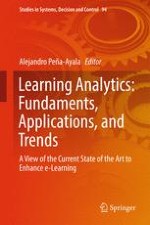
2017 | OriginalPaper | Buchkapitel
8. Knowledge Discovery from the Programme for International Student Assessment
verfasst von : Mirka Saarela, Tommi Kärkkäinen
Erschienen in: Learning Analytics: Fundaments, Applications, and Trends
Aktivieren Sie unsere intelligente Suche, um passende Fachinhalte oder Patente zu finden.
Wählen Sie Textabschnitte aus um mit Künstlicher Intelligenz passenden Patente zu finden. powered by
Markieren Sie Textabschnitte, um KI-gestützt weitere passende Inhalte zu finden. powered by